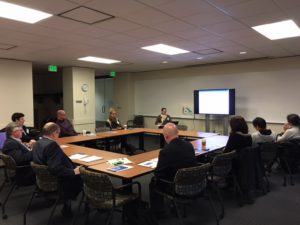
On October 19, 2017, WSCRC convened the eighth session of the Policy Briefing Series at Harris Bricken Law Firm in Seattle. Murray Lee, owner of MKL Enterprises, and William Perry, an international trade lawyer, addressed the issue of free and fair trade in the United States’ trade policies regarding China.
Mr. Perry explained that free trade is vitally important to the wellbeing of the US economy and to its global competitiveness. In Mr. Perry’s opinion, it is critical that the US remain stalwart on issues of free and fair trade as the global trend leans ever more strongly toward Free Trade Agreements (FTAs). His concern regarding the current administration’s push toward protectionist policies is the risk they pose to agriculture and the high-tech industry, both of which rely heavily on trade and exports. Perry urges policy makers to consider three factors as they create policies which will have seriously implications for the US economy. Firstly, that they bear in mind that compromise is the essence negotiation, and that other nations have a right to sovereignty and to seeking their own economic interest. Secondly, that the costs of not joining a trade partnership must be carefully weighed. Lastly, they must consider that unwillingness to negotiate may result in loss of credibility and influence, which could portend reciprocally difficult demands upon the US in future negotiations as well as relinquishment of global influence.
In Murray Lee’s opinion, the issue of reciprocity stands at the forefront of US trade relations with China. Mr. Lee expects that the two systems—the United States’ market driven economy and China’s centrally controlled system—will come to a head in the coming decades; the “question of the century” is what the collision will look like. China faces a “host of challenges and…panoply of complex issues,” explained Mr. Lee, but China’s ambition to attain global economic preeminence cannot be underestimated. “Reciprocity is needed, but I don’t think it’s there right now,” Mr. Lee concluded. Consequently, Mr. Lee advocates that we “proactively anticipate” problems, and create a game plan to address them. This will require engagement at every level to promote dialogue, delineate boundaries, and eventually create fair and reciprocal trade access.